David’s Performance Text:
ἔνθ᾽ ἄλλοι μὲν πάντες, ὅσοι φύγον αἰπὺν ὄλεθρον,
οἴκοι ἔσαν, πόλεμόν τε πεφευγότες ἠδὲ θάλασσαν:
τὸν δ᾽ οἶον νόστου κεχρημένον ἠδὲ γυναικὸς
νύμφη πότνι᾽ ἔρυκε Καλυψὼ δῖα θεάϝων
ἐν σπέσσι γλαφυροῖσι, λιλαιομένη πόσιν εἶναι.
ἀλλ᾽ ὅτε δὴ ϝἔτος ἦλθε περιπλομένων ἐνιαυτῶν,
τῷ οἱ ἐπεκλώσαντο θεοὶ ϝοἶκόνδε νέεσθαι
εἰς Ἰθάκην, οὐδ᾽ ἔνθα πεφυγμένος ἦεν ἀέθλων
καὶ μετὰ οἷσι φίλοισι. θεοὶ δ᾽ ἐλέαιρον ἅπαντες
νόσφι Ποσειδάϝωνος: ὁ δ᾽ ἀσπερχὲς μενέαινεν
ἀντιθέῳ Ὀδυσῆϝι πάρος ἣν γαῖαν ἱκέσθαι.
ἀλλ᾽ ὁ μὲν Αἰθίοπας μετεκίαθε τηλόθ᾽ ἐόντας,
Αἰθίοπας τοὶ διχθὰ δεδαίαται, ἔσχατοι ἀνδρῶν,
οἱ μὲν δυσομένου Ὑπερίονος οἱ δ᾽ ἀνιόντος,
ἀντιόων ταύρων τε καὶ ἀρνειῶν ἑκατόμβης.
ἔνθ᾽ ὅ γε τέρπετο δαιτὶ παρήμενος: οἱ δὲ δὴ ἄλλοι
Ζηνὸς ἐνὶ μεγάροισιν Ὀλυμπίου ἁθρόοι ἦσαν.
τοῖσι δὲ μύθων ἦρχε πατὴρ ἀνδρῶν τε θεῶν τε:
μνήσατο γὰρ κατὰ θυμὸν ἀμύμονος Αἰγίσθοιο,
τόν ῥ᾽ Ἀγαμεμνονίδης τηλεκλυτὸς ἔκταν᾽ Ὀρέστης:
From ‘A literal impression of Homer’s Odyssea from someone who’s literally heard it’, by A. P. David:
There were all the rest of them, as many as fled steep destruction,
Already at home; escapees from war, not to mention the sea.
It was that man alone, in want of his return home, not to mention his woman—the wife—
Whom a bossy young nymph was holding back: Calypso, radiant among goddesses,
Within her hollowed caves, desiring him as her husband.
But when the year arrived, as round and around they come to the point again,
Within which the gods spun for him to make his return home
Into Ithaca, not even there was he escaped from his struggles,
Even among his own near and dear. And all of the gods felt pity
Apart from Poseidon; that one used to rage in a frenzy
Against Odysseus, god’s match, before he reached his motherland.
The thing is, that god was gone visiting among the Flaming-Eyes, who exist afar off.
Your Aethiopes are divided in two, the furthest distant of men,
Some where Hyperion sets and some where he rises.
He went to attend a roasted cookout of bulls and young rams.
There he was, at any rate, having a good time seated at the feast. But the rest of them
Were gathered in the chambers of Zeus, the Olympian.
And amongst them he started the conversation, the father of men and of gods,
For he minded, in his life’s breath, about blameless Aegisthus,
The man whom Agamemnon’s son killed—far-famed Orestes.
Greek text hyperlinked to lexica via Perseus (perseus.tufts.edu):
ἔνθ᾽ ἄλλοι μὲν πάντες, ὅσοι φύγον αἰπὺν ὄλεθρον,
οἴκοι ἔσαν, πόλεμόν τε πεφευγότες ἠδὲ θάλασσαν:
τὸν δ᾽ οἶον νόστου κεχρημένον ἠδὲ γυναικὸς
νύμφη πότνι᾽ ἔρυκε Καλυψὼ δῖα θεάων
ἐν σπέσσι γλαφυροῖσι, λιλαιομένη πόσιν εἶναι.
ἀλλ᾽ ὅτε δὴ ἔτος ἦλθε περιπλομένων ἐνιαυτῶν,
τῷ οἱ ἐπεκλώσαντο θεοὶ οἶκόνδε νέεσθαι
εἰς Ἰθάκην, οὐδ᾽ ἔνθα πεφυγμένος ἦεν ἀέθλων
καὶ μετὰ οἷσι φίλοισι. θεοὶ δ᾽ ἐλέαιρον ἅπαντες
νόσφι Ποσειδάωνος: ὁ δ᾽ ἀσπερχὲς μενέαινεν
ἀντιθέῳ Ὀδυσῆι πάρος ἣν γαῖαν ἱκέσθαι.
ἀλλ᾽ ὁ μὲν Αἰθίοπας μετεκίαθε τηλόθ᾽ ἐόντας,
Αἰθίοπας τοὶ διχθὰ δεδαίαται, ἔσχατοι ἀνδρῶν,
οἱ μὲν δυσομένου Ὑπερίονος οἱ δ᾽ ἀνιόντος,
ἀντιόων ταύρων τε καὶ ἀρνειῶν ἑκατόμβης.
ἔνθ᾽ ὅ γ᾽ ἐτέρπετο δαιτὶ παρήμενος: οἱ δὲ δὴ ἄλλοι
Ζηνὸς ἐνὶ μεγάροισιν Ὀλυμπίου ἁθρόοι ἦσαν.
τοῖσι δὲ μύθων ἦρχε πατὴρ ἀνδρῶν τε θεῶν τε:
μνήσατο γὰρ κατὰ θυμὸν ἀμύμονος Αἰγίσθοιο,
τόν ῥ᾽ Ἀγαμεμνονίδης τηλεκλυτὸς ἔκταν᾽ Ὀρέστης:
Samuel Butler’s prose translation with certain names Hellenised:
So now all who escaped death in battle or by shipwreck had got safely
home except Odysseus, and he, though he was longing to return to his
wife and country, was detained by the goddess Calypso, who had got
him into a large cave and wanted to marry him. But as years went by,
there came a time when the gods settled that he should go back to
Ithaca; even then, however, when he was among his own people, his
troubles were not yet over; nevertheless all the gods had now begun
to pity him except Poseidon, who still persecuted him without ceasing
and would not let him get home.
Now Poseidon had gone off to the Ethiopians, who are at the world's
end, and lie in two halves, the one looking West and the other East.
He had gone there to accept a hecatomb of sheep and oxen, and was
enjoying himself at his festival; but the other gods met in the house
of Olympian Zeus, and the sire of gods and men spoke first. At that
moment he was thinking of Aegisthus, who had been killed by Agamemnon's
son Orestes;

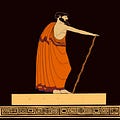





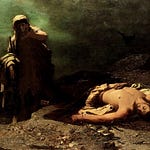
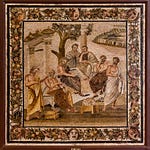
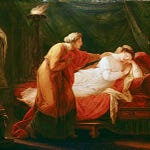
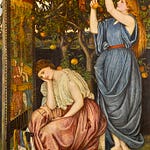
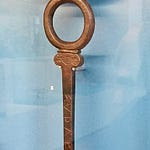
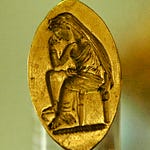
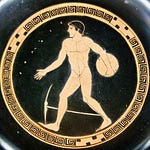
Homer's Odyssey 1.11-30